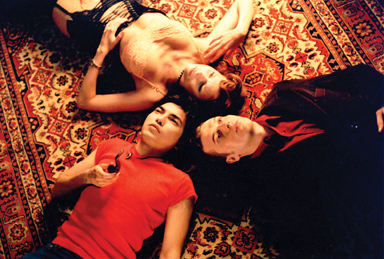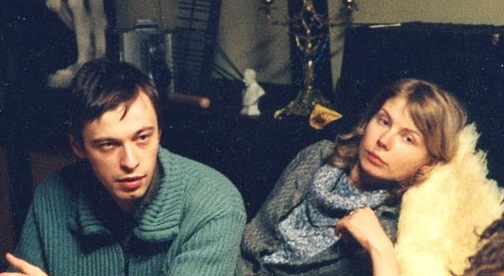|
|
|
|
|
You I Love
[Я люблю
тебя]
Russia,
2004
Color, 85 minutes
Directors: Ol'ga Stolpovskaia, Dmitrii Troitskii
Script: Ol'ga Stolpovskaia with Dmitrii Troitskii
Camera: Aleksandr Simonov
Set Design: Konstantin Vitavskii
Music: Rigardas Norvila
Cast: Liubov' Tolkalina, Evgenii Koriakovskii, Damir Badmaev, Irina
Grineva, Iurii Sherstnev
Production:
Malevich Productions Producers: Ol'ga Stolpovskaia, Dmitrii
Troitskii
|
|
|
The
project that became You I Love was more than five years in the
making; work on the script began in 1998.
It is unclear why the simple declarative of the Russian title
[literally, "I Love You"] has been twisted into the almost
incomprehensible English version upon which the authors apparently
insisted. Perhaps it is an attempt to make clear that the declaration of
love, uttered several times in the film by two of the three main
characters, is never simply the joyful realization and affirmation of
relationship, but can and often is a confession of confusion, a ritual act
of dissimulation, and occasionally the prelude to an impending and
senseless disaster.

The
film introduces two young and successful inhabitants of a no longer
post-Soviet but rather quite cosmopolitan Moscow.
Timofei (Evgenii Koriakovskii), a talented and upwardly mobile
creator of media advertising campaigns, begins a romance with Vera (Liubov'
Tolkalina), a television news anchor with celebrity status.
Their personal and professional successes are imaged in the film
with a kind of artificial glossiness that suggests that their happiness
may be not only dependent upon but also defined by the new media with
which they work and live. Before they have time to work out the parameters
of their relationship, Timofei's well-ordered world is thrown into turmoil
by the arrival out of the blue (actually, the black of the night sky) of
the young Kalmyk Uliumzhi (Damir Badmaev), who falls upon Timofei's moving
car and is slightly injured. Timofei
is forced to take in the unregistered migrant to avoid complications with
the police. In remarkably
short order, the Asian youth has employed his mysterious and mystical
Eastern power to seduce his host, thus setting up an uncomfortable but
inevitable ménage a trois, in which "I love you" can no
longer be a personal and meaningful declaration from lover to beloved, but
becomes a tentative, complicated and increasingly desperate attempt to
find meaning and human contact in a world that seems to lack both.
The
film is structured as a hodgepodge of contrasts and themes that do not
seem to form any coherent artistic whole.
The artificiality of contemporary life in the Russian capital city
is juxtaposed with a purportedly more natural lifestyle embodied by
Uliumzhi, who seems to have a spiritual bond with the animal kingdom but
can make no sense of an ATM machine.
Consumption as the pathology of urban society finds expression in
Vera's "secret passion," while true human feeling must be mediated
through money, technology, or role-plays.
Ethnic stereotypes are deployed to interrogate questions of
sexuality, anxieties around gender roles are exploited to expose social
and economic cleavages. In
the West the film has been marketed as Russia's first self-consciously
gay film, while in Russia it has been called a scandalous film about love.
The film is an unwieldy assortment of impulses that bear witness to
its own mixed heritage. It is
an ambitious attempt at a union of incompatibles: commercial cinema and
the tradition of Russia's parallel cinema movement.
|
Ol'ga Stolpovskaia and Dmitrii Troitskii

|
 Ol'ga
Stolpovskaia (b. 1969) and Dmitrii Troitskii (b. 1971) are both
native Muscovites, both completed their film training in the
Workshop of Individual Directing in 1997, and have partnered in a
number of artistic projects. You
I Love is their first feature film. Their formation as
filmmakers is deeply indebted to the Russian Parallel Cinema
movement, in particular to Boris Iukhananov and Gleb Aleinikov (who
appears in You I Love as one of the "deputies").
In addition to their work as writers, producers, and
directors, Stolpovskaia and Troitskii have appeared in front of the
camera in Ivan the Fool [Иван-дурак]
(co-directed by Aleksandr Dulerein and Sergei Koriagin, 2003).
Stolpovskaia is the author of numerous short films, videos,
and multi-media projects, including Bruner's Trial [Суд
над
Брунером] (with
D. Troitskii, 1999), later acquired by the Museum of Modern Art in
New York. She is
currently producing of a number of television shows.
Troitskii has also worked in television production since 1999
and has recently made a name for himself as producer of the
notorious TV reality show Hunger on TVT. Ol'ga
Stolpovskaia (b. 1969) and Dmitrii Troitskii (b. 1971) are both
native Muscovites, both completed their film training in the
Workshop of Individual Directing in 1997, and have partnered in a
number of artistic projects. You
I Love is their first feature film. Their formation as
filmmakers is deeply indebted to the Russian Parallel Cinema
movement, in particular to Boris Iukhananov and Gleb Aleinikov (who
appears in You I Love as one of the "deputies").
In addition to their work as writers, producers, and
directors, Stolpovskaia and Troitskii have appeared in front of the
camera in Ivan the Fool [Иван-дурак]
(co-directed by Aleksandr Dulerein and Sergei Koriagin, 2003).
Stolpovskaia is the author of numerous short films, videos,
and multi-media projects, including Bruner's Trial [Суд
над
Брунером] (with
D. Troitskii, 1999), later acquired by the Museum of Modern Art in
New York. She is
currently producing of a number of television shows.
Troitskii has also worked in television production since 1999
and has recently made a name for himself as producer of the
notorious TV reality show Hunger on TVT.
|

|
|
|
|